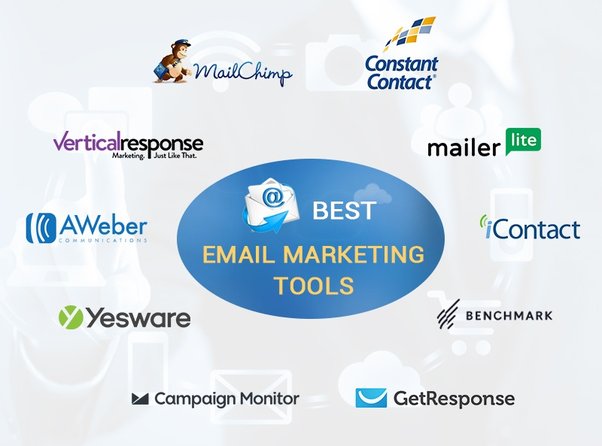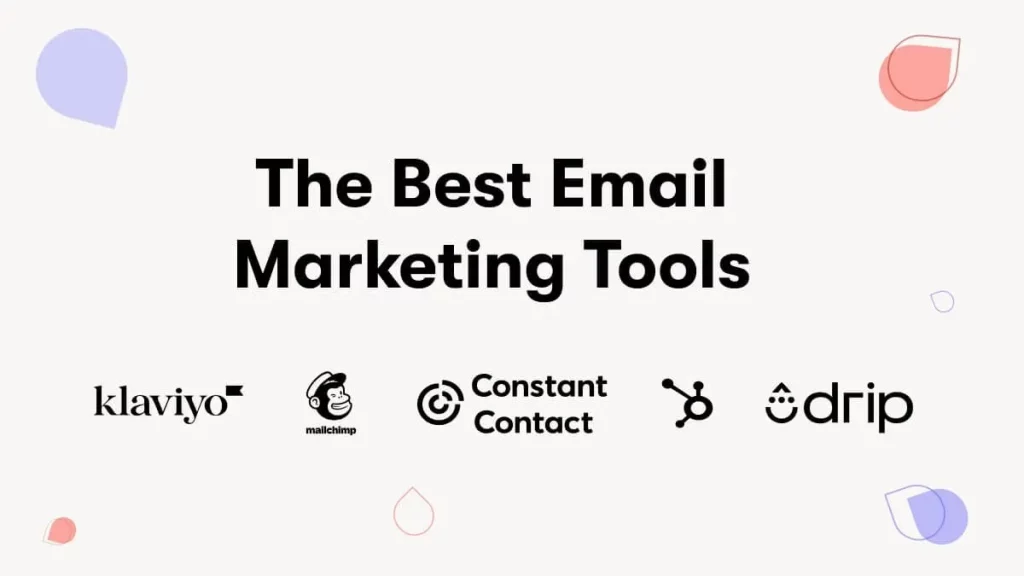The Ultimate Guide to Choosing the Best Email Campaign Tools for Your Business

As a business owner, you understand the importance of effective marketing strategies to reach your target audience and drive sales. Email marketing is one of the most influential and cost-effective tools in today’s digital age. But you need the correct set of tools to make the most of your email campaigns.
Email campaign tools are software platforms designed to streamline your email marketing efforts, allowing you to create, automate, and analyze your campaigns. These tools provide a wide range of features that help you segment your audience, personalize your messages, and track the success of your campaigns.
Table of Contents
Why Email Marketing is Important for Businesses
Before diving into the world of email campaign tools, let’s take a moment to understand why email marketing is crucial for your business.
First and foremost, email marketing allows you to communicate directly with your audience. Unlike social media or other advertising methods, emails land directly in your subscribers’ inboxes, giving you a higher chance of being noticed and engaged.
Secondly, email marketing is highly cost-effective. With minimal costs, you can reach many subscribers and generate a high return on investment.
Additionally, email marketing allows you to build and nurture relationships with your customers. You can establish trust and loyalty by sending personalized and relevant content, leading to repeat purchases and brand advocacy.
Key Features to Consider When Choosing Email Campaign Tools

Now that you understand the importance of email marketing, it’s time to explore the key features you should consider when choosing the best email campaign tools for your business.
- Email Automation: Look for tools with automation capabilities to create drip campaigns, welcome sequences, and abandoned cart reminders. Automation will save you time and ensure your messages are sent to the right people at the right time.
- Segmentation and Personalization: Effective email marketing relies on targeting the right audience with personalized content. Choose tools that offer robust segmentation options, allowing you to divide your subscribers based on demographics, behavior, or purchase history.
- Email Design and Templates: A visually appealing email can significantly impact your subscribers. Look for tools that provide a wide range of professionally designed templates and an easy-to-use drag-and-drop editor.
- Analytics and Reporting: To measure the success of your email campaigns, you need access to comprehensive analytics and reporting. Choose tools that offer detailed metrics such as open rates, click-through rates, and conversion rates.
- Integration with Other Tools: Consider the compatibility of your chosen email campaign tools with your existing marketing stack. Look for seamless integration with your CRM, e-commerce platform, and other marketing automation tools.
Top Email Campaign Tools in the Market

Now that you know what features to look for, let’s explore some of the top email campaign tools available.
- Tool A: Tool A is a robust email campaign tool that offers a wide range of features for businesses of all sizes. It provides an intuitive drag-and-drop editor, advanced segmentation options, and powerful automation capabilities. With its comprehensive analytics and reporting, you can track the success of your campaigns and make data-driven decisions.
- Tool B: Tool B is known for its user-friendly interface and extensive template library. It offers advanced segmentation and personalization options, allowing you to create highly targeted campaigns. Tool B also integrates seamlessly with popular CRM platforms, making it an excellent choice for businesses looking to streamline their marketing efforts.
- Tool C: Tool C is a popular choice among e-commerce businesses. It integrates with major e-commerce platforms, allowing you to create personalized product recommendations and abandoned cart reminders. With its advanced automation capabilities, you can set up complex workflows to engage your customers throughout their journey.
A Detailed Review of Each Email Campaign Tool
Tool A
Tool A is a feature-rich email campaign for businesses of all sizes. Its drag-and-drop editor makes it easy to create visually stunning emails without any coding knowledge. The tool offers advanced segmentation options, allowing you to target specific audience segments with personalized content. Tool A’s automation capabilities also enable you to set up complex workflows and trigger emails based on user behavior.
Tool B
Tool B stands out for its user-friendly interface and an extensive collection of professionally designed templates. Whether you’re a beginner or a seasoned marketer, Tool B offers a seamless experience with its intuitive drag-and-drop editor. The tool also provides advanced segmentation options, allowing you to create highly targeted campaigns. With its comprehensive analytics and reporting, you can track the performance of your campaigns and make data-driven decisions.
Tool C
Tool C is an excellent choice for e-commerce businesses. It integrates seamlessly with major e-commerce platforms, allowing you to create personalized product recommendations and abandoned cart reminders. The tool’s automation capabilities enable you to set up targeted workflows based on user behavior, ensuring your customers receive relevant content at the right time. Tool C also offers comprehensive analytics, providing insights into the performance of your campaigns and the effectiveness of your marketing strategies.
Pricing and Plans Comparison of Email Campaign Tools
When choosing the best email campaign tool for your business, it’s essential to consider the pricing and plans offered by each tool. Here’s a comparison of the pricing structure of the top email campaign tools mentioned:
ToolPricingFeatures
Tool A
$X/month
Drag-and-drop editor, advanced segmentation, automation
Tool B
$Y/month
User-friendly interface, extensive template library, analytics
Tool C
$Z/month
E-commerce integration, personalized recommendations, automation
It’s essential to evaluate your budget and requirements before making a decision. Consider factors such as the number of subscribers you have, the frequency of your campaigns, and the level of automation you require.
Case Studies Showcasing Successful Email Campaigns Using Specific Tools
To illustrate the effectiveness of email campaign tools, let’s explore some real-life case studies showcasing successful email campaigns using specific tools.
Case Study 1: Tool A in Action
Company XYZ, an e-commerce business, implemented Tool A in its email marketing strategy. By utilizing the advanced segmentation options, it was able to target specific customer segments with personalized recommendations. As a result, it experienced a 25% increase in click-through rates and a 15% increase in conversion rates.
Case Study 2: Tool B Driving Engagement
Non-profit organization ABC leveraged Tool B to engage donors and increase donations. With its extensive template library, they created visually appealing emails that resonated with their audience. After implementing Tool B, the organization saw a 30% increase in open rates and a 20% increase in donations.
Case Study 3: Tool C Boosting Sales
Tool C was a game-changer for Company XYZ, an online retailer. By integrating their e-commerce platform with Tool C, they were able to send personalized abandoned cart reminders. This resulted in a 40% decrease in abandoned carts and a 25% increase in sales.
How to Integrate Email Campaign Tools with Your Existing Marketing Stack
Integrating your chosen email campaign tools with your existing marketing stack is crucial for seamless operations and data synchronization. Here are some steps to follow when integrating your tools:
- Evaluate Compatibility: Ensure your email campaign tools are compatible with your existing CRM, e-commerce platform, and other marketing automation tools. Check for any necessary plugins or connectors.
- Sync Data: Set up data synchronization between your tools to ensure all customer information, purchase history, and engagement data are shared across platforms. This will enable you to create targeted campaigns and deliver a consistent experience.
- Test and Monitor: Once the integration is complete, thoroughly test the setup to ensure that data flows correctly and automation works as expected. Monitor the performance of your campaigns to identify any issues or areas for improvement.
Best Practices for Using Email Campaign Tools Effectively

To maximize the effectiveness of your email campaign tools, follow these best practices:
- Build a Quality Email List: Build an engaged and opted-in email list. Offer incentives for sign-ups and regularly clean your list to remove inactive subscribers.
- Segment and Personalize: Leverage the segmentation capabilities of your email campaign tools to send targeted and personalized content. Delivering relevant messages to the right audience will significantly improve engagement and conversion rates.
- Test and Optimize: Continuously test different elements of your email campaigns, such as subject lines, visuals, and calls to action. Analyze the results and optimize your campaigns based on the insights gained.
- Monitor and Improve: Regularly monitor the performance of your email campaigns using the analytics and reporting provided by your email campaign tools. Identify areas for improvement and implement changes accordingly.
What Tools Are Available for Running Successful Email Marketing Campaigns?
Several tools are available to help you run successful email marketing campaigns. Some popular options include:
- Tool D: Known for its advanced automation features and comprehensive reporting.
- Tool E: Offers a user-friendly interface and extensive template library.
- Tool F: Specializes in e-commerce integration and personalized recommendations.
Each tool has its unique features and pricing structure, so it is essential to evaluate your business requirements and choose the best fit for your needs.
Conclusion: Making the Right Choice for Your Business
Choosing the best email campaign tools for your business is a critical decision that can significantly impact the success of your marketing efforts. You can make an informed decision by considering key features, reviewing top tools, and understanding best practices. Remember to evaluate your budget, requirements, and integration capabilities when selecting the tool that aligns with your business goals. With the right email campaign tools, you can create highly targeted campaigns, engage your audience, and drive business growth.
Contact our team today to learn more about how email campaign tools can revolutionize your marketing efforts.






